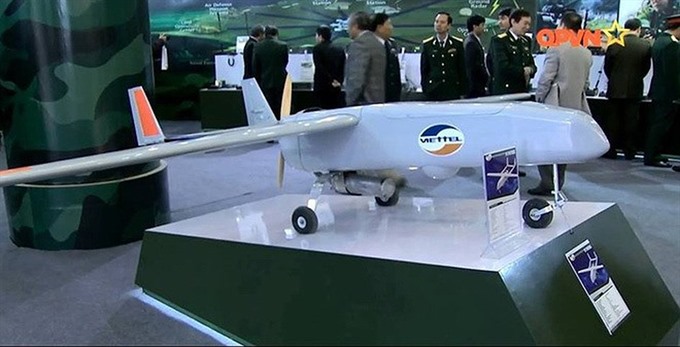 Economy
Economy

The term “fourth industrial revolution” is bandied about in the media, but what is it and how can it help improve living standards?
 |
| Viettel has developed unmanned aerial vehicles (UAVs). — Photo: qpvn.vn |
HCM CITY — The term “fourth industrial revolution” is bandied about in the media, but what is it and how can it help improve living standards?
Viettel Group deputy general director, Đỗ Minh Phương, said: “The fourth industrial revolution includes the internet of things (IoT), artificial intelligence (AI), Big Data, 3D printing, smart energy, organic food, and green living and the revolution will deploy all technological advancements to address existing problems.”
Technologies like Big Data, IoT and AI, which are at the core of Industry 4.0 – another term for the fourth industrial revolution -- are dependent on data storage and processing.
Viettel IDC is one of the biggest data solution providers in Việt Nam.
Five years ago only enterprises with deep pockets dared set up data centres with a number of servers, which cost up to VNĐ100 million (US$5,000) each, and involving many other expenditures.
Viettel IDC set up a 500sq.m centre at a cost of $15 million to serve 500 customers. It required 500 rack positions for 2,400 servers.
Since 2013, cloud and visualisation technologies have allowed the company to have just a 30sq.m room with six rack positions and 72 servers to serve 5,000 customers.
The latter centre cost just a seventh of the previous one but capacity in terms of customers doubled. Tariffs for customers have also reduced 23 times in comparison with previous years.
The falling tariffs mean more customers can access cutting-edge technologies, and in the last two years Viettel IDC has quadrupled its number of clients.
In the past, both customers and network service providers used to obsess about spam. But service providers would focus on key words and subscribers sending too many messages, and it was not an effective method.
Since 2015, Viettel has been adopting new technologies like machine learning, Big Data, natural language processing, and anomaly detection to stop spam, and has managed to cut the number down from 10 million a day to just 150,000.
The anti-spam system works like the human brain.
Having enough servers to store large volumes of data is the way to help develop IoT in Việt Nam.
Recently Viettel introduced a parking application based on IoT for use in HCM City. Firstly, a GPS locates the car, cameras find empty spaces to park in and online payment allows customers to pay easily.
“The Viettel My Parking app is very friendly, convenient and saves time and effort for drivers,” Nguyễn Đông Hải of Bình Dương Province said.
More problems, more benefits
Viettel is also using industry 4.0 technologies to solve its own problems.
In the past, analysing staff had to spend a lot of time to combine information from hundreds of business reports to identify demand and customers’ habits, but now they get accurate answers by clicking a few keys.
The company has over 20,000 staff and it has to regularly monitor their efficiency.
At Viettel Telecom’s operation centre, green, yellow and red buttons flash continuously on screens, tracking employees’ performances. Yellow and red mean the performance is not good and the system immediately sends a warning to these workers and their managers.
Managers sitting in Hà Nội can know about the performance of any worker, even if they are working in a remote or mountainous area.
Salaries, promotions and demotions are based on this.
The services each subscriber uses are identified for their nearest base transceiver station (BTS) and updated every hour.
This data is vital for Viettel Telecom to get a comprehensive overview and make adjustments or adopt new business strategies for individual localities.
Viettel has an operation centre in all 10 of its international markets too.
Besides, it has another technical operation centre in Hà Nội to manage its 150,000 BTSs and 360,000km of fibre-optic cable in its 11 markets around the world.
The company has also developed unmanned aerial vehicles (UAVs), which just require 10 square metres of space and can fly straight up.
They can monitor things like natural resources and high-voltage transmission lines and prevent smuggling.
Viettel has set up a tank simulator using virtual reality technology enabling crews to train. This system is helping resolve problems related to equipment, space and costs.
Last year it signed agreements with 16 cities to make them smart cities, and with 14 provinces, nine ministries, and 19 corporations and banks for information security.
It has also succeeded in manufacturing secure 4G smartphones, becoming one of only five companies in the world with the capability.
In future smartphones will become a wallet, a computer, a key, and a remote control for smart devices, and for this information security will obviously be a vital need.
Cities will soon set up smart camera systems to enhance public security and order and ease traffic congestion.
For all these, Viettel has invested in an extensive and highly modern 4G infrastructure and set up a VNĐ1 trillion (US$43.5 million) venture fund to invest in enterprises, both Vietnamese and foreign, with cutting-edge technologies.
Last year the group reported a turnover of $11 billion, double the 2016 figure, making it one of the 25 largest telecom companies in the world.
Profit before tax was nearly $2 billion, 13 per cent up and accounting for 60 per cent of all profits earned by State-owned companies.




